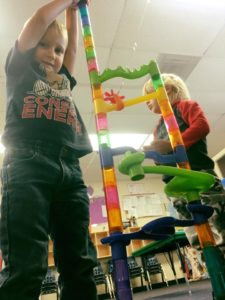Are you promoting Critical Thinking Skills for your young child?
~By: Alyssa Paddie
Teacher at Ready, Set, Grow! Preschool
Communicating with children in a deep meaningful way while promoting critical thinking doesn’t necessarily come naturally to us parents. As a parent of three children I often found myself communicating out of necessity when they were younger. “Please brush your teeth, be safe, eat your veggies, etc.” I have also answered more questions then I could have possibly imagined. To be completely honest there were days I felt that parenting was more about getting through the day with healthy, happy children and a semi-sane Mother. I realize now after 12 child development courses, three years of teaching and watching my children grow, I was a bit near sighted.
As an early childhood educator I strive to be an intentional teacher. As stated by Ann S. Epstein “Intentional means teachers act with specific outcomes or goals in mind for children’s development and learning.” I have found being intentional whether as a parent, teacher, employee or leader requires goals and an array of strategies.
First, if our goal is to create a rich learning experience it’s imperative we see the child as an individual, how they interact with peers and their interests. What do they struggle with, where do they excel? Do they have the ability to communicate their needs with others? Have they learned self regulation yet? Observation as it was taught to me is both an art and a science. When personal bias, a snap judgment or a bad mood occurs by the observer the data collected is no longer useful. The observer must stay present and neutral considering everything from the child’s perspective. As I do not conduct formal observations in the classroom I benefit from the education of observation and assessment and use these tools to ensure our learning opportunities are consistently high quality. As a parent I would advise to observe your children without an agenda, be present and in a positive emotional space. Jot down what surprises you. Use the information to connect with your child and create learning experiences for them. This could be anything from counting money at the grocery store to engaging in open ended art.
The second strategy I use is to incorporate the children’s interests to what and how we learn. For example I had a student one year that showed interest in teaching himself to ride a tricycle. He would often become frustrated. I saw a learning opportunity to teach resilience. Every school day I would invite him to ride the tricycle and observe the progress he made. I would consistently give him specific positive feedback. The look of pride on his face when he said “Miss Alyssa! Look at me, I know how to do it all by myself!” filled me with joy and reassured me of my purpose.
Lastly is the use of language as I spoke about in the first paragraph. Asking thought provoking questions can challenge a child and create curiosity enhancing almost any activity your child is doing. Below are list of questions that can be used to promote critical thinking skills. These questions have the most impact when asked in a warm, safe environment, where the child is engaging in a learning opportunity that is developmentally appropriate and of interest to them. These questions can be utilized in any activity ranging from art to pretend play to playing with legos. Happy growing!
Questions to Prompt Critical Thinking Skills
Watch closely and use well times questions or comments to prompt children to-Think aloud
What are you doing now?
What have we got here?
What is next?
Reflect on their actions and solutions
What did you do before that worked?
How did you know? How did you figure that out?
What do we need to solve the problem?
How we will keep track of the ones we’ve counted?
Make Predictions
I wonder what will happen if……
What will it look like if………
What’s going to happen next?
Will the same thing happen every time?
If you do ___________ what will happen?
Provide justifications for their choices or answers
Why did you chose that?
How did you decide on that one?
Why are you putting three of them there?
Go further in their thinking
Can you find another way to?
How and Why questions
How can we find out?
How did that happen?
How can we do that?
How is ___________ the same as ___________?
Why do you think______________?
Why do you like_______________?
Why would you_______________?
Resources:
Think before you (inter)act: what it means to be an intentional teacher; Ann S. Epstein (2009)
Questions to promote critical thinking skills; Copley 2000; Dodge, Calker & Heroman 2000 Greenes (1999).


Amazing post! Thanks for sharing!
Thank you for the positive feedback Crystal!